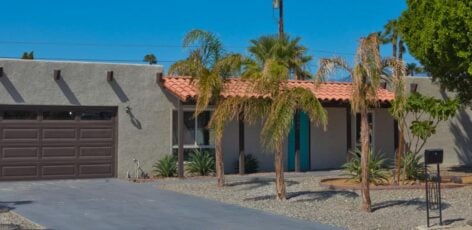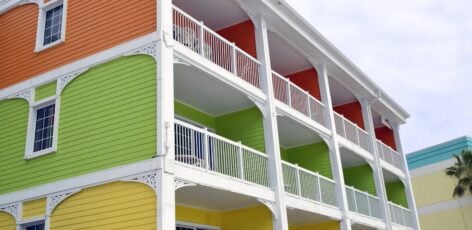ON THIS PAGE…
For investors thinking about buying a new vacation home investment property, the very first question that comes up is, are vacation rental properties profitable?
It’s a great question, and one of the most important. But the answer isn’t as straightforward as one might hope. In this post, we’ll dive into the numbers and take a look at some case studies from real short-term rental properties, then offer some tips and strategies to help you make an informed decision in your investment journey.
The Short Answer: It Depends.
The profitability of vacation rentals is not a certainty. As we always tell our owners: if you want a guarantee, buy a toaster.
Short-term rentals are just one of many types of real estate investment strategies you can utilize to earn a great return on your hard-earned money. But the thing to keep in mind is that STRs are a business. And like all businesses, some are profitable and others are not.
So, the short answer to the question, “are vacation rental properties profitable?” is that sometimes they are, sometimes they aren’t. In fact, we’ve spoken to some owners and actually told them NOT to do a vacation rental with their property because the numbers didn’t make sense.
One major factor of vacation rental properties worth considering is that a net loss—or the opposite of a profit—does not mean the investment wouldn’t be valuable to you. Indeed, there are some benefits to operating “in the red.”
Companies like Uber haven’t made a penny of profit but have attracted millions of dollars of funding and continue to extend their reach globally. Another example is one of the biggest vacation rental management companies, Vacasa, who operate at a loss but are publicly traded and are still growing year after year.
If you’re thinking about purchasing a vacation rental property, it’s worth distinguishing between “profit” and “value”. The former is objective and based on hard numbers. The latter is subjective and based on each investor’s unique situation and financial goals.
As you learn more about short-term rental investment properties, you start to understand that, as a business, it’s a machine. And you can build the machine any way you want to make it work for you.
When are Vacation Rental Properties NOT Profitable?
Some VRs are like a charming mom and pop shop where the 1st-floor space is the storefront facilitating the business operation while the upstairs space is where the family lives. There’s a business component and a lifestyle component.
If you want a vacation home for lifestyle purposes, you may opt to drop profitability on pecking order of priorities. In some circumstances, your vacation home may be an ADU in your backyard. In other cases, you may live a few hours away either by car or plane.
For most owners, it’s the latter, where their use of the home is temporal, not spatial. In other words, they’ll use their vacation rental property as time permits due to cost and convenience factors that make it unfeasible for them to use it more often.
Whereas if the rental unit is in their backyard, they probably don’t need to you use it very much at all except for the occasional friend or family that comes to town.
When Are Vacation Rental Properties Profitable?
Vacation rental properties are profitable if—and only if—you do certain things in certain ways. If you want to have a profitable vacation home, you need to take a thoughtful approach to your investment in the same way that you follow a recipe with various steps and ingredients.
The three main ingredients of a profitable vacation rental property are equity, appreciation, and cash flow. Let’s take a closer look at how each of these contribute to your recipe for success…
Home Equity
Home equity reflects the value of your stake in the property as a homeowner. It’s calculated by taking all liabilities on the property against its current market value.
This ingredient is present anytime you purchase a property, whether you’re renting it or not. You don’t get this financial benefit when renting because the money you’re paying in rent every month is going to someone else who owns the property.
Basically, home equity allows your short-term rental property to become a piggy bank for your cash, stacking up over time to be re-used or recycled in whichever way you need. Every time you make a mortgage payment, you’re usually paying down the liabilities tied to the property.
Property Appreciation
Regardless of the cause, appreciation reflects an increase in value that can be found with nearly all residential real estate investments.
Appreciation takes various forms and includes several causal factors, many of which are actually unrelated to you or your property, sometimes referred to as “market forces.” An example would be when a new residential development gets approved down the street, or when a national sports franchise migrates to your city, or when the county changes zoning and/or vacation rental regulations.
Of course, the value of your real estate investment property can also increase based on things that you do personally, like home improvements. For example, adding an in-ground pool or hot tub, updating the HVAC systems or adding solar panels for greater energy efficiency, and so on…
Appreciation isn’t as certain as equity but it’s a pretty reliable variable for profitability. Other real estate strategies factor appreciation into their business plan, too, like the Buy and Hold, which is a long-term play on appreciation, and the Fix and Flip which is a short-term play that cashes out on appreciation quickly.
When buying a vacation rental property, you can look at historical sales numbers in the local area to verify the trends for appreciation and then make an educated assumption about how your property will appreciate over time.
Cash Flow
Cash flow reflects the amount of money leftover after all expenses are paid and is often shown as the Net Profit (or Loss) on your financial statements. Profitable vacation rental properties lean heavily on this number, which is often viewed as the “dealbreaker” when conducting an investment analysis.
Remember, STRs are a small business—each one like a micro-hotel that operates with it’s own set of financial books. And as with standard hotels, there are varying degrees of certainty when it comes to cash flow.
There’s a reason some owners shy away from vacation rental properties, because of the volatility associated with the short-term rental strategy. While there’s a lot more financial upside, there’s also a steeper downside. It’s not a game for everyone but for those who do play it, cash flow is the primary scoreboard.
When purchasing a vacation rental property, you’ll want your business plan to revolve around this particular number because it will help clarify whether a short-term rental strategy is viable, or if the property would be better suited for a different strategy.
How To Maximize Profits For Vacation Rental Properties
Making a vacation rental profitable isn’t rocket science but it does take a basic understanding of certain “drivers” that will influence success. The two most important variables in the equation are:
- Marketing, or how effectively you generate income
- Operations, or how efficiently you manage expenses
How you handle these two facets of your STR business will determine exactly how profitable you’ll be at the end of the day, month, and year.
Vacation Rental Marketing
Are vacation rental properties profitable? Yes, but… only if you deploy effective marketing strategies that put your vacation home in front of the right people, at the right time, in the right way.
One of the biggest mistakes we see new owners make is not thinking about marketing early enough in their investment journey. To maximize the profitability of a vacation home, you need to start thinking about marketing as early as possible—ideally before you even purchase the home.
For example, one of the questions you’d want to ask before ever buying a vacation rental property is, “Is this home in a ‘hot’ market or not?”
- What’s the average ADR and Occupancy in this market?
- Does the market have long peak seasons or does it have extreme highs and lows?
- Are local regulations favorable or unfavorable?
All of these questions play into the income potential of the home.
Now let’s say you’ve actually chosen a great market and are now looking for properties to buy. Every time you consider a property, you should be imagining what the pictures will look like on the listing, what kind of amenities would be offered, or how the floor plan complements (or detracts from) the optimal guest setup.
The more “marketable” the home is, the more profitable it can be.
Marketing equals income. Income leads to return. The higher the return, the more profitable the vacation home.
If you’re buying a vacation rental property without thinking about marketing, then you’re probably shooting yourself in the foot before you even get started.
Vacation Rental Operations
Are vacation rental properties profitable? Yes, but… only when you operate efficiently by using processes and systems that help you deliver high-quality experiences to every guest, every stay.
When we educate owners about the costs and fees associated with vacation rentals, we start off by outlining the differences between standard real estate costs vs vacation rental costs.
The key question becomes, “What’s directly related to operating a short-term rental?”
Things like mortgage, insurance, and property taxes are all standard real estate expenses and should fall outside the measure of operational efficiency. That’s because those expenses need to be paid whether you’re hosting guests or not.
Operating costs are expenses that are only incurred when you’re hosting guests. You’ll want to zero in on these and make sure you’re fine-tuning them month after month until you’ve got them all dialed in.
Here are some of the operational costs you can expect to pay for, with or without the help of a property management company:
- Landscaping
- Housekeeping, which may or may not include laundry service
- Pool and/or Spa Maintenance
- General Repairs and Maintenance
- TV, Cable, and Internet Services
- Guest Recovery Costs
- Supplies and Consumables (like coffee, sunscreen, and toilet paper)
- Marketing Fees (like the host fees from Airbnb and Vrbo)
None of the above-mentioned expenses include the costs associated with actually starting the vacation rental operation, which is a whole different conversation (these are called “onboarding expenses”).
How often should the pool get cleaned, or the yard get trimmed?
How many sets of sheets and towels should you have stocked?
What kind of supplies should you buy for your guests, and how much should you spend on them?
These are all questions that invite decisions about how you want to run your vacation rental business. Each decision will translate to your day-to-day operation and subsequently reflect in your bottom line.
Your Plan For A Profitable Vacation Rental Property
In the STR market—especially if you’re new to the industry—you may want to consider using a 3-year plan to optimize your vacation home’s success while responsibly managing cash in and out of your investment property.
Here’s the outlook we usually provide (keeping in mind that it varies by property and/or market):
Year 1: Build The Business
The first year is all about building the business. Primarily, this includes developing the brand, the reputation, and understanding product-market fit. In other words, this is the time for proof of concept.
In the first year of marketing your vacation rental, you’ll want to do things that “tip the scale” in your favor. For example, instead of coming out hot with guns blazing as you launch your listing, it’s better to take a more subtle approach with your advertising. Aim to under-promise and over deliver so that your initials guests feel like they’re getting way more value than what they paid for.
Starting off with a below-average ADR will also incentivize traction and increase booking conversion as you build momentum. In essence, you’re trading margin for traffic by prioritizing Occupancy. This leads to more bookings, which garner more reviews, and help you build credibility faster.
Your first year also consists of working out operational “kinks” that you could never plan for. Understanding guests’ frequently asked questions, optimizing the check-in process, and tweaking the guest journey are all important areas of focus as you start hosting.
Click here to learn how industry veterans avoid common vacation rental problems.
Year 2: Optimize The Business
If you’re building the business in Year 1, you’re re-building it in Year 2.
After your first year, you’ll have a good sense of the product you have to offer, what kind of people enjoy the product, and how much they’re willing to pay for it. Armed with this vital information, you can start sculpting the business in a way that adapts to what you’ve learned.
With some experience under your belt, you may also find that your original assumptions about the property were actually wrong…
For example, when we spent six weeks onboarding Serenity, we initially thought that we’d be hosting family and friend groups. Eventually we learned that we weren’t booking very many friend groups at all but were instead appealing to working professionals who needed a home base while they were in Hawaii for a temporary job assignment.
Another big opportunity for improving in your second year is your revenue management strategy. Having a full twelve months of historical data to scrutinize really helps put things in perspective when determining your rates. Looking back to compare your revenue forecast vs what you actually earned could also reveal seasonality trends that you missed the first year (for example, specific event weekends).
Once you’ve homed in on what works, all of your energy should be focused in that direction. If your best reviews and highest dollars are from professionals, add some upgrades that would make their day. If you get feedback and suggestions from guests, make sure to act on them. This kind of feedback will fuel your bottom line for years to come.
Year 3: Scale The Business
First you experiment. Then, when you find what works, you do more of it. Once you’ve standardized the experience and are confident in your ability to delivery a great product, you start building the next product. This is what we call scaling the business.
In other words, Year 3 is about expansion. With some experience under your belt, and an operation that your comfortable with, you start flexing your creativity by extending your reach into the more nuanced dimensions of the hospitality industry.
Can you find new sources of revenue to add onto your rental income?
For example, we started hosting production shoots at one of our properties and earned 3x the typically nightly rate in just one day—and we didn’t even need to clean!
Can you leverage local partnerships or secure wholesale deals to shave down your operating costs?
After connecting with well-known suppliers in the industry, we were able to start saving up to 80% off retail prices at brands like Home Depot, Wayfair, and Brooklinen. Even more, we’ve found ways to get free products placed inside our homes so guests can enjoy more quality amenities.
Not All Vacation Rentals Are Created Equal
Remember, this vacation rental business plan is just a template you can use. Certain things might not apply to your situation.
Since each property and each owner is unique, this business plan may need to be extended or compressed based on the circumstances. For example, if you’re in a niche market with a unique kind of short-term rental offering, or an undeveloped market that’s yet to take off, you may very well knock it out of the park and be able to scale in Year 2 or even late in the Year 1.
On the other hand, if you buy a short-term rental property and don’t set yourself up for success from the beginning, it may take a bit longer to start scaling—or you may not be able to scale at all.
When vacation rental properties are profitable, it’s not necessarily because they followed a specific formula. Instead, it’s often because those operating the business focused on just a few things and did them well.
How To Ensure Your Vacation Rental Stays Profitable
In three words: hire an expert.
You wouldn’t hire a personal trainer to perform dental surgery, nor would you hire an accountant to do your laundry. The reason financial advisors exist as a profession is the same reason professional property managers can be found in nearly every vacation destination.
When profit is top of mind, the best play is to recruit a Who that knows How.
To decrease the uncertainty of your investment, try engaging the services of a vacation home rental agency or, at the very least, working with a real estate agent or broker that’s familiar with vacation rental properties.






